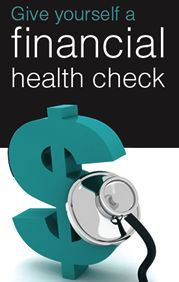Do you get stressed or worried about money? Have there been arguments in your household about money and bills? Are you losing sleep over your debts? If you answer yes to any of these questions, the chances are your financial health is at risk.
A financial check up – just like a medical check up – will give you an overview of your situation and highlight areas which need attention. The rewards can be huge and you may find yourself wondering why you didn’t tackle this years ago. So how do you get started?
When Maria phoned the 0508 BUDGETLINE (283 438) freephone number two weeks ago, she was struggling with her finances. But she couldn’t spare the time to get help over the phone, and with three young children to look after and no car, she couldn’t get to her local budgeting advice service.
Maria was directed to www.familybudgeting.org.nz where she downloaded three worksheets that are used by budgeting services when they are working with clients: a debt schedule, budget worksheet, and cashflow forecast.
The debt schedule allowed Maria to list all the debts she had (including her student loan, bank loans and finance company loans). She also typed in the amounts she owed, any arrears (overdue), and what repayment arrangements she had. This provided an easy way for Maria to view her debts in one place, and to understand the burden the family was carrying. No more head in the sand!
The budget worksheet itemises what money is coming in, and what is going out. The first draft is an honest look at how you use your money now, covering all expenses in a year – a weekly average is calculated for you and shows whether you have more than enough to meet your expenses (a surplus) or whether you’re falling short (a deficit). Maria found herself with a moderate deficit ($45 per week) and used the worksheet to reduce some of her expenses to balance her budget.
Next Maria set some goals. This involves deciding what is important for you to work towards. Saving for your retirement? A holiday? Paying off the mortgage more quickly? Getting rid of that credit card debt? Make adjustments to your budget worksheet to produce a balanced budget, allowing extra for your goals. This may mean that you have to trim spending in other parts of your budget to allow for this. Or, you may need to find ways to increase your income. Maria decided a trip home to Vanuatu was something she had wanted for a long time, and allocated $20 per week to go into a special account for this. This meant she had to cut out her weekly cafe lunch and scale back the amount she spent on presents for her family.
The cashflow uses the figures in the budget worksheet to look ahead. It allows you to itemise your income and expenses on a weekly or fortnightly basis, for up to a year or more. You can then manage and control your finances to ensure there is always money available to meet planned payments on the day they are due. No more overdue accounts!
Since Maria was computer literate, highly motivated, and not in too much trouble, this was all she needed to get on track. The plan that she drew up showed that she would be able to afford to get to Vanuatu, with some spending money, in eight months. She was delighted.
How could you give yourself a financial check up?
Just like Maria, you could give yourself a financial check up, by following these five steps:
- Visit www.familybudgeting.org.nz and download the three key documents: a debt schedule, budget worksheet, and cashflow forecast.
- Put your current debts into the debt schedule. This gives you an overview of your current situation. It will help to have your most recent statements and contracts handy.
- Put your current spending in the budget worksheet. Be honest with yourself. Use bank statements to help you calculate average amounts. This will show you if you have a surplus or a deficit.
- Once you’ve completed a budget worksheet with your current spending, consider creating a second with reduced spending. Look at items that are optional luxuries, such as takeaway lunches, to reduce your deficit. Keep going until you have a surplus… it may not be easy.
- Put these figures into the cashflow forecast. This will ensure that you have money available when you need it, and will show you how your bank account swells until bills become due (then deflates). Importantly, it will show you that if you spend at certain times of the year you will struggle at other times.
This is a similar process to that a budget adviser would follow. If you need any help assessing your financial health, a budget adviser could sit down with you and work through it together. Sometimes it’s good simply to have someone to bounce ideas off.
You’ll find your local budgeting services in the White Pages or on www.familybudgeting.org.nz. Alternatively, a free call to our budgeting advice line 0508 BUDGETLINE will give you the details. All our services are free, confidential and non-judgemental.





